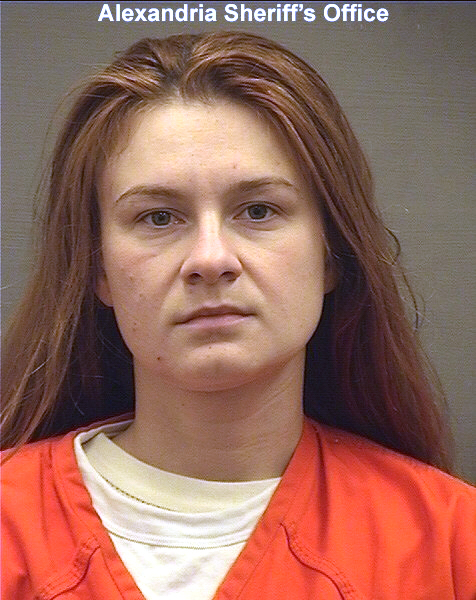She used to say she just really liked guns and hanging out with politicians. Now, she admits she was a Russian agent trying to influence U.S. politics.Maria Butina, the Russian gun enthusiast accused of attempting to secretly penetrate American right-wing political circles, pleaded guilty to conspiring to act as a foreign agent in a Washington, D.C., courtroom Thursday. She became the first Russian citizen to be convicted in the sprawling investigations into Russia’s influence on the 2016 election.Butina, 30, told the court she’d acted “under direction of” a Russian official who’s been widely identified as a man named Alexander Torshin. Torshin reportedly retired last month from his job as deputy director of Russia’s central bank."Butina sought to establish unofficial lines of communication with Americans having power and influence over U.S. politics," a prosecutor said in court, CNN reported.Since her arrest in July, prosecutors have said Butina worked to build up relationships with American politicians through her contacts with the National Rifle Association. In 2015, she publicly quizzed then-candidate Donald Trump on his views on Russian sanctions.Although prosecutors had once accused her of offering up sex in exchange for political influence, the most salacious details of the case against her were later quietly walked back. In a filing in September, prosecutors said that part might simply have been “mistaken.”Butina could face up to five years in prison. She’s currently being held in solitary confinement in a northern Virginia jail. On Wednesday, Butina agreed to cooperate with investigators in exchange for less prison time.In plea documents read aloud in court, she admitted to taking part in a “Diplomacy Project” that she proposed in March 2015 and which was coordinated by Torshin. She asked for $125,000 from a Russian billionaire so that she could travel around the U.S., meeting with GOP presidential candidates and NRA leaders.She’s widely expected to provide information about the activities of a Republican political operative named Paul Erikson, who became her boyfriend after they met when he was on a trip to Moscow in 2013.Erickson, a conservative from South Dakota who managed the 1992 presidential campaign of Pat Buchanan, has reportedly visited Butina in prison.In a statement distributed to the press Wednesday, Erickson’s lawyer, William Hurd, said: “Paul Erickson is a good American. He has never done anything to hurt our country and never would.”Intelligence experts observing her case have said Butina doesn’t fit the mold of a straight-up Russian spy.“She was likely not a staff officer, but what we call an ‘access agent,’” John Sipher, a former CIA officer based in Moscow, told VICE News. “That is, she was working for the Russian services as a source to help them spot, assess and target Americans.”While she now claims to have been coordinating with Torshin, a longtime Russian government official, their effort might really have been, effectively, freelance spying that wasn’t tightly linked up with Russia’s traditional spy agencies, said Mark Galeotti, an expert on Russia’s security services based in London.
On Wednesday, Butina agreed to cooperate with investigators in exchange for less prison time.In plea documents read aloud in court, she admitted to taking part in a “Diplomacy Project” that she proposed in March 2015 and which was coordinated by Torshin. She asked for $125,000 from a Russian billionaire so that she could travel around the U.S., meeting with GOP presidential candidates and NRA leaders.She’s widely expected to provide information about the activities of a Republican political operative named Paul Erikson, who became her boyfriend after they met when he was on a trip to Moscow in 2013.Erickson, a conservative from South Dakota who managed the 1992 presidential campaign of Pat Buchanan, has reportedly visited Butina in prison.In a statement distributed to the press Wednesday, Erickson’s lawyer, William Hurd, said: “Paul Erickson is a good American. He has never done anything to hurt our country and never would.”Intelligence experts observing her case have said Butina doesn’t fit the mold of a straight-up Russian spy.“She was likely not a staff officer, but what we call an ‘access agent,’” John Sipher, a former CIA officer based in Moscow, told VICE News. “That is, she was working for the Russian services as a source to help them spot, assess and target Americans.”While she now claims to have been coordinating with Torshin, a longtime Russian government official, their effort might really have been, effectively, freelance spying that wasn’t tightly linked up with Russia’s traditional spy agencies, said Mark Galeotti, an expert on Russia’s security services based in London.
Advertisement
COOPERATION AGREEMENT

Advertisement
AN UNLIKELY SPY
“To me, this is nothing to do with espionage as we think of it,” Galeotti told VICE News. “I think it’s more nuanced and stranger than that.”Butina and Torshin may have been attempting to build relationships that could become useful to the Kremlin — if, and when, they were needed, Galeotti said.“To me, this looks more like freelancing in an environment in which the Kremlin has made it very clear that it’s keen to entertain freelancing,” Galeotti said. “The Kremlin wants people to go out there and be active, but isn’t going to tell people how to do it.”Cover image: In this April 21, 2013 file photo, Maria Butina, leader of a pro-gun organization in Russia, speaks to a crowd during a rally in support of legalizing the possession of handguns in Moscow, Russia. (AP Photo/File)“The Kremlin wants people to go out there and be active, but isn’t going to tell people how to do it.”